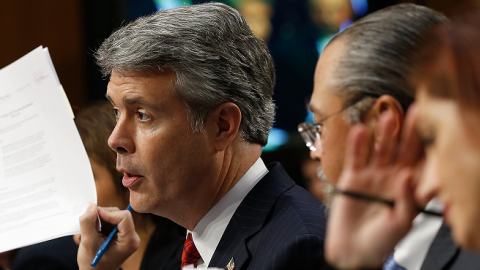Three months after the Federal Communications Commission issued a notice of proposed rule making” for new rules to regulate the Internet, more commonly known as “net neutrality,” a decade-old debate is reaching a fever pitch. This week alone, the FCC will hold multiple roundtable discussions and Congress will discuss the matter in three separate hearings — including a Senate Judiciary Committee hearing Wednesday where I will testify.
During my seven years as a FCC commissioner, I supported policies that promoted an open and freedom-enhancing Internet. But as I will outline this morning to the committee, the FCC must resist the compulsion to institute burdensome Internet regulations that break away from the long-standing, bipartisan public policy that has allowed the net to blossom.
The Internet is the greatest deregulatory success story of all time. Nothing is broken that needs fixing. Until the FCC actually conducts a bona fide peer-reviewed market study to identify potential problems (which it apparently has no plans to do), calls for “solutions” — including reclassification of the Internet as a common carrier utility under Title II of the Communications Act of 1934, and the application of net neutrality to wireless service — are unnecessary and counterproductive.
First, the notion that retrofitting Title II, an antiquated, but powerful 80-year-old statute designed for the copper-based, analog, voice-only phone monopolies of the early 20th century, should be the centerpiece of American tech policy is misguided. Likewise, fabricating a new and untested body of law will create uncertainty as well as perverse unintended consequences that will lay the legal and policy foundation for regulation to spread beyond the ostensible regulatory target of network operators, such as phone and cable companies, to the entirety of the Internet ecosystem, such as content, applications and content delivery networks.
Proponents of regulating the Internet under Title II argue that doing so would prevent “two-sided” markets and usage-based pricing and “discrimination” of Internet traffic. In fact, the exact opposite is true. Title II permits these and is so powerful it would provide the commission with the ability to eventually regulate the entire Internet ecosystem. It is foolish to believe that government regulations of one area of the Web would not spread to others, because it is impossible to draw a principled line between broadband service providers and other entities that combine transmission with information processing or storage, such as the content delivery networks that give us Netflix movies or YouTube videos.
With a dynamic and competitive marketplace that is providing consumers with a cornucopia of innovation and choices, why change the landscape?
The same is true as the FCC seeks to impose new net neutrality regulations on a wireless industry that has invested nearly $400 billion in infrastructure since its inception and remains the fastest growing segment of the broadband market. In the commission’s 2010 net neutrality order, it was the bipartisan and unanimous consensus of the FCC that the heart of new net neutrality rules not be applied to wireless broadband services. The underlying rationale was that mobile broadband technologies use radio frequencies in which consumers share bandwidth with their neighbors. Being a shared network creates a host of technical and operational challenges associated with the availability of capacity, the lack of predictability about consumer demand and the scarcity of spectrum.
As such, the intricate art of network management of wireless networks is far different from that of fiber or coaxial-based networks. Applying one-size-fits-all regulations to mobile broadband would tie the hands of engineers trying to maximize network efficiency for consumers as they are forced to live under new and politicized “mother-may-I” government supervision.
A new regulatory burden would also hinder the continued growth of a wireless industry that has thrived from a “hands-off” regulatory approach. Analysts’ projections estimate that between 2013 and 2017 wireless infrastructure investment will generate as much as $1.2 trillion in economic growth and create (directly and indirectly) up to 1.2 million new jobs. This eye-popping investment in America will result in an estimated $85 billion to $87 billion of economic growth each year from 2013 through 2017, giving a 2.2 percent boost in gross domestic product by 2017, and enhance America’s position as the leader in 4G, or LTE — a decisive advantage in the highly competitive global marketplace.
Indeed, intrusive regulations could greatly hinder this bountiful sector of the American economy.
The Internet ecosphere is blossoming beautifully and has produced the most positive and constructive transformation of the human condition in history. Let’s learn from what has worked and not jeopardize the future with the uncertainty of a new regulatory regime.















